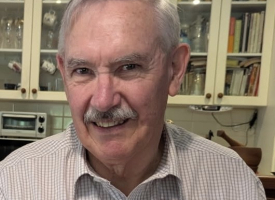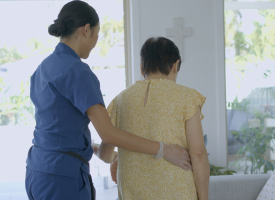Transcript: AMA President Professor Steve Robson on ABC Far North, Cairns
AMA President Professor Steve Robson spoke to ABC Far North, Cairns about the federal government's allocation of Commonwealth Supported Places.

QUESTION: Professor Steve Robson is the President (of the AMA). And Professor Robson, I'm quite sure that you've been looking at these allocated places. Do you believe that the federal government got it right?
STEVE ROBSON: Good morning. Thanks very much for having me on. And you're absolutely correct, the Australian Medical Association is absolutely committed to making sure that rural, regional and remote Australians have access to the medical care, to the doctor, not only doctors, but all the health services that they need. And I just want to start by paying tribute to James Cook University, which has got an international reputation for being able to train and retain doctors in rural and regional areas. So JCU is doing a fantastic job up there at the moment.
QUESTION: Well, that's right. That's why we would have liked to have seen a few more medical placements.
STEVE ROBSON: Look, it's a really good question and I think around the country, your listeners, you yourself, everybody who lives in a rural or regional and particularly a remote area struggles to get the healthcare they need. And it's across general practice. It's psychiatrists, you know, Lord help you if you've got a mental health condition in your family and are trying to get help in rural and regional areas, having a baby if you need a paediatrician. All of these services are in just critically short supply around the country. So the first thing I want to say is I think it's fantastic that this government is looking at funding places and of course there's going to be competition right around the country. But having medical school places is very, very important. And you are 100 per cent correct in saying that if we can find and train and retain people who live in rural and regional areas, it's a fantastic way of trying to keep doctors working in those areas. But medical schools, while important, are part of the solution. A lot of people don't realise that once you graduate from a medical school, in a way it's just the start of training and to become a GP, for example, it can take up to 5 or 6 years of additional training after medical school. And if you want to become a super specialised surgeon or something, it can take even longer. So medical schools are critically important, but making sure there's then a pathway for somebody who graduates from a medical school in Cairns, in Townsville, in Rocky, wherever around the country can then find and do their super specialised training so that they can become a great psychiatrist or a great surgeon supplying and servicing the area. So that's the other part of the puzzle that really needs further work as well. But I understand the disappointment, but there'll be plenty more to come, I think.
QUESTION: Will there? Because that's something that we haven't actually been able to find out. What if there is a particular cycle or when the next allocation will come? What do you get? What do you hear?
STEVE ROBSON: I get a sense that the current federal government, the minister, are absolutely committed. They get the problem. They understand that rural and regional Australia has huge problems accessing a doctor. It's a huge task, making sure that is addressed properly. And we know in fact there's been a huge increase in the number of medical students over the previous government's term, but it hasn't actually translated into, you know, bums on seats in rural and regional areas. So I think making sure that we get the levers and processes right to make sure that if a young person graduates as a newly minted doctor in a regional area, that they're then incentivised to do that additional training they need to be a GP, to be a psychiatrist or paediatrician or whatever, and put down roots and become part of rural and regional communities. And that's the bit of the puzzle that's still being worked on. But we're really hopeful that there'll be some solutions. And the AMA actually ran a rural training summit a few weeks ago. I'm pleased to report that the federal government and the Department of Health came along to listen to everything. So we're hopeful, but I get the disappointment. I understand that. But I think you know, looking at the big picture, JCU are really kicking goals and I think there's a lot more work to be done that they'll be involved in.
QUESTION: Absolutely. Well, James Cook University really held up as the as the gold standard for not only turning out medical graduates, I think they account for about 9 per cent of all health graduates, but more than 40 per cent of those that remain practising in regional, remote and very remote locations. So that certainly augurs very well for those 20 new places and the new intake that has happened at Cairns in the last year. One thing that was alarming though was to hear from the vice chancellor yesterday talking about, you know, the disappointment of missing out on 80 places and we're not sure when or if there will be another allocation in the near future. But according to the Association of Australian Deans, there's an estimated shortfall of 1000 medical places across Australia. So Dr. Robson, how does the AMA feel about that? That to me feels like we're kind of just fiddling at the edges with these placements.
STEVE ROBSON: I agree with you, Charlie. I think there is a real concern of this sort of fiddling at the edges. And one of the huge problems is that about ten years ago Australia had a government body called Health Workforce Australia that looked at where the need was. It looked around the country at where the need was for doctors, healthcare overall, you know, doctors, nurses, psychologists, all of the people that communities depend on for health care, diabetic educators, etcetera. It took a very broad view, but that was defunded by a previous government. And it's really felt a bit like a rudderless ship for a long time now. So the AMA has been calling for governments to say, look, we can't let this rudderless ship drift any longer. We need to be absolutely across very precisely where the areas of need are. Where is it difficult for rural and regional Australians, for example, to see a doctor? What kind of doctors do they need there and how can we plan those workforces? Because it takes such a long time to train people. And I think we're reaping the I guess the consequences of defunding that health workforce body a decade ago. But we're hopeful. And we're hearing very good murmurings from the current government that they're planning on getting some sort of mechanism up and running again that can do all of this work and make sure that your listeners are responded to, that the government understands very precisely what the needs are for your listeners, your community and how that can be provided. But I think the fact there's been very little planning for a decade is really showing up around the country now.
*ENDS*



